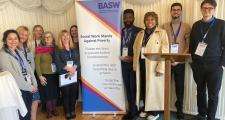UK Government survives Welfare Bill scare

The UK Government’s controversial plans to reform the welfare system has overcome its first hurdle in parliament, staving off a rebellion from backbench Labour MPs but only thanks to a plethora of last-minute concessions. The final result was 335-260 in favour of progressing the Bill.
The government argued that the Bill intended to support more disabled people into work who currently feel ‘trapped’ in the welfare system. They also hoped to save an estimated £2.5 billion from the Welfare budget.
However, the plans were met with significant worry from opponents, who said that the severity of the cuts being proposed would push approximately 150,000 people into poverty. There was also outrage that no consultation with disabled people has so far taken place.
Widespread calls from campaign groups for MPs to reject the Bill were vocal. BASW joined with 85 disability and human rights groups across the UK in expressing alarm at the potential impact of the reforms on vulnerable people and urging the government to rethink their approach.
Thanks to this pressure, Ministers were forced into making a number of concessions on their plans. This included changes to Personal Independent Payments (PIP) only applying to new claimants from November 2026 and not those currently in receipt of support.
This didn’t go far enough for many MPs though, intensifying fears within the government that they risked a humiliating defeat if further changes were not made. Thus, during the debate, the Minister for Social Security and Disability, Sir Stephen Timms announced that the government were abandoning changes to PIP for everyone until after a review of the benefit has concluded. This dropping of the Bill's flagship measure represents a major climbdown on the original plans.
The full statement that BASW joined with partners in sending to MPs ahead of the vote reads:
"We are coming together as organisations committed to fighting poverty, providing advice, and supporting and championing the rights of disabled people, their families, and carers. We stand firmly with disabled people and their organisations in calling for the UK government to withdraw the UC & PIP Bill and to undertake genuine dialogue with disabled people to shape reforms centred on the rights and dignity that all disabled people need and deserve.
At a time when the share of GDP spent on working-age social security has remained stable for the last ten years, cutting the incomes of disabled people is a political choice. There is time for the government to pursue alternatives. If this Bill is voted through, then by 2030 it will have cut PIP for more than 400,000 disabled people and Universal Credit for more than 700,000 people who are disabled or have a long-term health condition. These numbers will only increase in the years to follow.
This Bill has also been brought before parliament:
- Without consultation with disabled people
- Without any assessment of its impact on health and employment outcomes
- Before the planned review of the PIP assessment has properly begun its work
- Without knowing how the outcome of the PIP review may affect these reforms
The changes announced last week and the compressed timetable for scrutiny mean that MPs will only have a single day to debate or amend the new provisions. There is too much at stake for disabled people for this Bill to be rushed through without the opportunity for meaningful challenge or scrutiny. We urge all MPs to vote against this Bill at Second Reading."
BASW Reaction
Following the vote, BASW Chief Executive Dr Ruth Allen said:
“Disabled people across the UK have endured months of uncertainty, worry and stress because of the original proposals in this ill thought-through Welfare Bill and how it has been handled in recent weeks. They have been badly let down by government’s proposals and by the lack of co-production with people affected by proposed changes to vital support.
“The government’s climbdown on changes to Personal Independence Payments (PiP) is welcome, but these ill-thought proposals need much further amendment to make them fit for purpose and fair. And the proposed deep cuts to Universal Credit included in the Bill are extremely worrying. Reforming our welfare system through focusing more on helping people back to work could be a laudable aim but current proposals will worsen not improve living standards and quality of life, are likely to backfire as worsened health and social outcomes will further exclude people from being able to work and participate fully in society, and are creating political turmoil which could have been avoided.
“It’s fundamental that the government now commits to genuine dialogue with disabled people to shape reforms centred on the rights and dignity that they need and deserve. If this Bill cannot adequately protect the most vulnerable in our society from hardship or prevent demand on social work services from increasing, then the government must withdraw it.”
BASW has also written to the Work and Pensions Secretary alongside partners to persuade the government to exempt care leavers from the proposal to restrict the health element of Universal Credit to those over the age of 22. Read the letter here.
What happens now?
The decision to drop the PIP section of the Bill will make it more tolerable for Labour MPs to support. It will now be cross-examined by a committee of the whole house, where more changes can be made, next week. Given how tight this first vote was though, the government will be on high alert about whether it could still be defeated, which might pave the way for yet more concessions.


